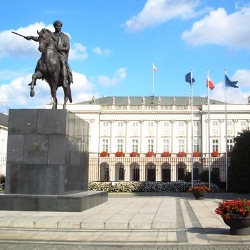Poland May Opt for Restricted iPoker State Monopoly

Poland has currently shut out all online poker sites as the country works to reform its gambling laws. Many industry experts thought that once the new legislation was in place, Poland might subsequently open its market up and accept new licensees under an improved framework. Unfortunately, that beginning to look increasingly less likely, and examining the new law, K&L Gates lawyer Dominika Mizielinska explains:
“The Draft Amendment addresses the demands of poker players by allowing organization of tournaments outside casinos and without a casino license, based on a prior notification to the Customs Office and tournament rules approved by the Minister of Finance. Also, playing poker online will become legal if organized by a state-owned company.”
About the New Law
The law slated to take effect in January 2017 seemed positive at first glance, as it expanded the number of games that could legally be played online, and even makes it possible for live poker tournaments to be held outside of casinos in places authorized by the government.
But there was one aspect of the law that negated any excitement that could have arisen from the seemingly looser regulations, and quickly quashed other positive aspects of the bill. Specifically, the law appears to want to establish a state party with just one operator providing games for the people of Poland. Gambling lawyers who have closely studied the bill report that online poker will fall under the state-run-only category, which would essentially mean that providers like partypoker, PokerStars and 888 may not be eligible for licensing.
But There’s Still Hope!
Gambling operators missing out on iGaming revenues from Poland, a country of around 39 million people, or close to that of California, would come as a big blow for the industry. While the GDP per capita of $13,500 is small compared to American standards, as an EU member nation, Poland’s economy is likely to grow in the coming years, meaning that people will have more disposable income to spend on recreational pursuits in the long term.
Therefore, the potential of Poland’s economy presents an opportunity that poker providers do not want to miss, and there is still some hope that they won’t have to. For one thing, it’s possible that the law is being interpreted too strictly, and that a state monopoly won’t completely prevent online poker operators from offering their online products in the country. One point that analysts highlight is a line in the proposed law which states that companies can apply for licenses to provide poker games outside of casinos. Immediately after that line, the law states that poker games can also be played on the Internet, which could mean that companies will, in fact, be allowed to apply for iPoker licenses. Also, the sentence referred to by analysts is that:
“The game of poker via the Internet, like other casino games, can be operated by the entity performing the state monopoly.”
In other words, it states that online poker “can be” operated by the state-run monopoly but doess not mention that it “must be”, or similar language. Furthermore, those analysts encouraging providers not to panic also point out that Poland’s state-run monopoly is likely to still partner with third-party providers in order to deliver poker similarly to how land-based casinos often partner with online operators. This could then remove doubt over whether the country’s casinos are willing to invest the amount of money required to develop and maintain good quality platforms.
Lastly, while the bill has passed, it’s not a done deal. The European Union must sign off on it, and there is a chance that the EU will not approve the law because it sets up a monopoly that could limit trade among EU nations.
Current State of Polish Market
Poland currently allows online sports betting, but the country’s Gambling Act prohibits internet poker and casino games from being offered. Nevertheless, international operators continue to see Poland as a grey area, and offer their sites for domestic consumption free from government interference. That is all likely to change soon, though, and as Ministry of Finance spokesperson commented:
“Illegal gambling operators will be subject to more severe consequences, which will hamper their operations and thus increase the market share of legal entities offering gambling.”
Amongst the raft of proposals suggested for dissuading operators from flaunting the country’s internet gambling laws are the imposition of heavy fines, the blocking of unauthorized websites, and the disruption of iGaming payment processing transactions.









